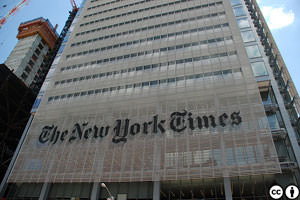All the News That’s Fit to Charge For
The New York Times' website may get more traffic than just about any other news site in the country, but the paper is still struggling to pay its bills and announced Wednesday that it will move to a metered pay model (continued).
The New York Times’ website may get more traffic than just about any other news site in the country, but the paper is still struggling to pay its bills and announced Wednesday that it will move to a metered pay model.
The change won’t kick in for another year, giving the paper plenty of time to gauge reaction and tinker with the concept. Starting next January, readers will be allowed a certain quota of free content, after which they will be required to pay a fee if they want more of the Times.
The paper used to charge for its opinionated material, and made some real money doing so, but starting giving away all of its content in a play for more eyeballs and advertisers.
Some papers already charge for online content while others have gotten more aggressive about increasing readership at any cost.
Newspapermen and women are fond of repeating the mantra that someone has to pay for the news, but it’s not clear that most readers will bother. Viewers of all three cable news networks have made it pretty clear that they don’t require high-quality journalism. Sites like TMZ have no trouble making money off their low-brow content and there’s plenty of free commentary — some of it actually quite good. Foundations and responsible citizens may be interested in funding quality news gathering, but so far most Americans seem perfectly happy with what they can get for free.
As media giants such as The New York Times start charging — hopefully so they can pay their reporters and editors a good wage for good work — it’s hard to imagine others won’t make a play for their tight-fisted readers.
An analyst quoted by the Guardian says “The newspaper industry made a big mistake about a decade ago when it accepted the false premise that information on the internet needs to be free. That has proven not to be a workable economic model for newspaper websites.”
Whether it’s workable for newspapers or not, it’s still the defining principle of the Web. Look no further than Wikipedia, which ranks as the 6th most popular website in the world and lives off the donations and free labor of its users, never charging for content or making space for advertisements.
Still, it would be nice if someone could crack this nut so we could stop reading about newspapers’ slow, depressing decline and get back to reading about, um, the news. — PZS
Your support is crucial…With an uncertain future and a new administration casting doubt on press freedoms, the danger is clear: The truth is at risk.
Now is the time to give. Your tax-deductible support allows us to dig deeper, delivering fearless investigative reporting and analysis that exposes what’s really happening — without compromise.
Stand with our courageous journalists. Donate today to protect a free press, uphold democracy and unearth untold stories.









You need to be a supporter to comment.
There are currently no responses to this article.
Be the first to respond.